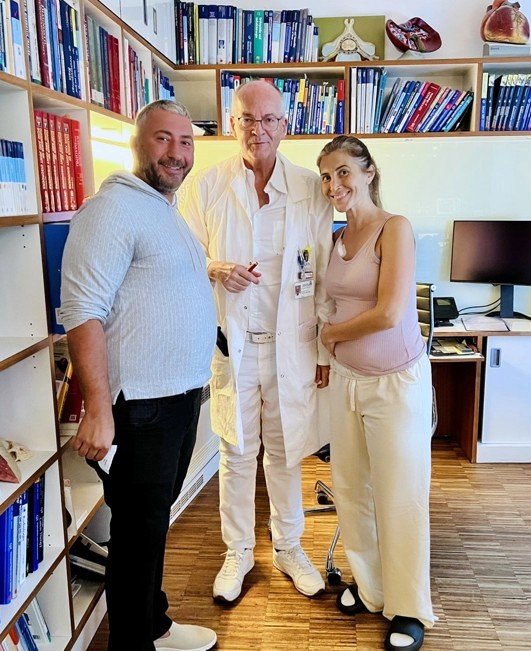
Doctors from all over the world pay attention to timely prophylaxis and diagnostics because at the early stages this disease is treated much easier.
Actinium-225 therapy, a groundbreaking targeted alpha therapy, is revolutionizing cancer treatment, particularly for advanced prostate cancer and other malignancies. Germany, a global leader in innovative cancer care, is at the forefront of implementing this precision medicine approach, attracting cancer patients worldwide.
Actinium-225 therapy is a form of targeted alpha therapy that uses the alpha-emitting radionuclide Actinium-225 to deliver high-energy radiation directly to cancer cells. With a half-life of approximately 10 days, Actinium-225 emits alpha particles that cause significant DNA damage to tumors while sparing healthy tissues due to their short range (50–100 microns). This therapy is particularly effective for metastatic cancers, such as advanced prostate cancer (metastatic castration-resistant prostate cancer, or mCRPC), and is being explored for leukemia, neuroendocrine tumors, and other malignancies. German oncology centers and nuclear medicine departments lead in integrating Actinium-225 therapy into multidisciplinary cancer care, offering hope for patients with limited treatment options.
Cancer symptoms vary depending on the malignancy but are critical to recognize for timely intervention with Actinium-225 therapy. For advanced prostate cancer, common symptoms include:
For other cancers, such as neuroendocrine tumors, symptoms may include abdominal pain, diarrhea, or hormonal imbalances. German specialists use diagnostic excellence to confirm these symptoms and tailor Actinium-225 therapy to patient needs, improving patient outcomes.
Precision Diagnostic Excellence for Actinium-225 Therapy
Accurate diagnostic excellence is essential to determine eligibility for Actinium-225 therapy and ensure effective cancer treatment. Germany’s nuclear medicine departments employ advanced diagnostic tools to assess tumor characteristics and patient health:
German radiologists and oncologists deliver meticulous diagnostic excellence, enabling personalized therapeutic advancements for cancer patients.
Germany’s Leadership in Actinium-225 Therapy
Germany’s innovative cancer care ecosystem is pioneering Actinium-225 therapy, offering therapeutic advancements for cancer patients with advanced disease. Oncology centers integrate this therapy with multidisciplinary cancer care to optimize survival rates.
Mechanism of Actinium-225 Therapy
Actinium-225 therapy leverages the high linear energy transfer (LET) of alpha particles to destroy cancer cells. Key aspects include:
German nuclear medicine specialists ensure precision, minimizing toxicity and enhancing anti-tumor efficacy.
Integration with Other Cancer Treatments
Actinium-225 therapy is often combined with complementary therapies to improve patient outcomes:
This multidisciplinary cancer care, led by German oncologists, maximizes therapeutic advancements.
Advancements through Clinical Trials
Germany’s prominence in clinical trials for cancer provides access to cutting-edge Actinium-225 therapy, often unavailable elsewhere. Trials in 2025 explore:
German oncology centers drive global research, advancing innovative cancer care.
Why Germany Excels in Actinium-225 Therapy
Germany offers unmatched advantages for cancer patients seeking Actinium-225 therapy:
Risk Factors and Prevention Strategies for Cancer
Preventing cancer supports treatment efforts with Actinium-225 therapy. Key risk factors for advanced prostate cancer and other malignancies include:
German specialists recommend regular screenings (PSA tests, PET-CT), healthy lifestyles, and risk management to reduce disease risk.
Comprehensive Multidisciplinary Cancer Care
Germany’s multidisciplinary cancer care ensures holistic cancer treatment:
This integrated approach, led by German oncologists and nuclear medicine specialists, optimizes anti-tumor efficacy.
Post-Treatment Support and Enhancing Quality of Life
After Actinium-225 therapy, German oncology centers provide comprehensive follow-up:
Germany’s patient-centric approach ensures cancer patients achieve sustained recovery and patient well-being.
Challenges and Future Horizons
Actinium-225 therapy faces challenges, including limited isotope availability and potential toxicity (e.g., xerostomia, renal damage from daughter isotopes like bismuth-213). German researchers address these through:
Future innovations, including theranostics and novel targeting agents, promise to expand therapeutic advancements.
Conclusion
Germany’s Actinium-225 therapy is transforming cancer treatment, offering hope for cancer patients with advanced prostate cancer and other malignancies. By integrating targeted alpha therapy, clinical trials, and multidisciplinary cancer care, German oncology centers deliver precise, impactful therapeutic advancements. Supported by world-class specialists and state-of-the-art technology, Germany ensures exceptional survival rates and quality of life. As a global leader in innovative cancer care, Germany provides a lifeline for cancer patients, blending scientific breakthroughs with compassionate support.
Frequently Asked Questions
What is Actinium-225 therapy for cancer in Germany?
It’s a targeted alpha therapy using Actinium-225 to deliver radiation to cancer cells, offered at German oncology centers.
What cancer symptoms are addressed by Actinium-225 therapy?
Symptoms like bone pain, fatigue, urinary issues, and weight loss, particularly in advanced prostate cancer.
How is cancer diagnosed for Actinium-225 therapy in Germany?
Through PSMA PET-CT, MRI, biopsies, and molecular profiling at German hospitals.
Are clinical trials for Actinium-225 therapy available in Germany?
Yes, German oncology centers explore combination therapies and new indications.
Is follow-up care provided after Actinium-225 therapy in Germany?
Yes, including imaging, rehabilitation, and emotional wellness support.
How does Germany compare to the UK/US for Actinium-225 therapy?
Germany leads in therapeutic advancements, faster access, and holistic care.
Can Actinium-225 therapy prevent cancer recurrence?
Targeted alpha therapy reduces recurrence risk by destroying metastatic cells.
Does Germany support international cancer patients?
Hospitals in Germany offer language assistance, travel coordination, and emotional wellness programs.
What are the latest advancements in Actinium-225 therapy in Germany?
Germany pioneers AI-driven dosing, theranostics, and novel chelators for enhanced efficacy.
How does Actinium-225 therapy differ from Lutetium-177 therapy?
Actinium-225 delivers higher-energy alpha radiation compared to Lutetium-177’s beta radiation, offering greater anti-tumor efficacy for resistant cases.
For more information or a free consultation, visit our contact us page.
Kindly complete the form below, and our dedicated team will reach out to you promptly. We look forward to connecting with you soon!
Trierer Straße, 56072 Koblenz, Germany
.webp)
.webp)
 (1).webp)
 (1).webp)


.webp)
.webp)
 (1).webp)
 (1).webp)

